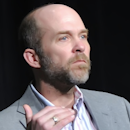From Genotype to Phenotype in Autism: The Role of Adaptive Physiology in Flies and Mice
- Speaker
-
 Graeme Davis, Ph.D.Morris Hertzstein Distinguished Professor of Medicine,
Graeme Davis, Ph.D.Morris Hertzstein Distinguished Professor of Medicine,
Department of Biochemistry and Biophysics,
Kavli Institute for Fundamental Neuroscience, University of California, San Francisco
Presidential Lectures are free public colloquia centered on four main themes: Biology, Physics, Mathematics and Computer Science, and Neuroscience and Autism Science. These curated, high-level scientific talks feature leading scientists and mathematicians and are intended to foster discourse and drive discovery among the broader NYC-area research community. We invite those interested in the topic to join us for this weekly lecture series.
The identification of rare de novo mutations that confer high risk for autism spectrum disorders (ASD) has generated tremendous new molecular insight and progress. Yet, in cases where a known mutation confers risk, additional processes contribute to the phenotypic severity of ASD. A concept called homeostatic plasticity has garnered considerable attention as an adaptive process that might be relevant and contribute to the spectrum of ASD in the human population. But virtually nothing is known at a mechanistic level regarding the interface of homeostatic plasticity and ASD genetics. Furthermore, there remains ongoing debate whether homeostatic plasticity is normally induced or whether it is impaired by gene mutations that confer risk for ASD.
In this lecture, Graeme Davis will describe a novel, unexpected genetic architecture that connects mutations in ASD-associated genes with the mechanisms of homeostatic plasticity in both invertebrate and mammalian nervous systems. In particular, Davis will present a novel means by which a diversity of ASD-associated risk genes may converge to disrupt homeostatic plasticity, thereby compromising the robustness of synaptic transmission. This information may be relevant to new therapeutic approaches that might someday alleviate the phenotypic severity of ASD, regardless of the underlying genetic mutation(s) that confer risk for ASD.
